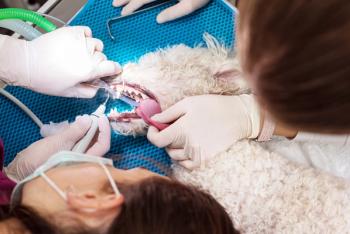
'Then things got weird at the practice '
Does veterinary practice ever feel like a freaky episode of "Black Mirror"? It's often the clients. (Nope, its always the clients. Love 'em, but what the what?!) Here are five tales readers shared with us. Enjoy.
(Shutterstock)Animal cruelty and a way-too-late attempt to do the right thing?
A client brought in his cat for an emergency. What was it? "I shot my cat to euthanize it, because it had an abscess and I didn't want to spend any money on it, but it didn't die."
We took the cat back to the treatment area to examine the extent of the neck wound. The “lucky” cat sustained a clean shot through the neck without hitting any vital structures. We clipped, cleaned, flushed and sent the cat home on antibiotics, all of which the client paid for.
We're not sure it could get more disturbing than that, but there's more...
(The dog pictured above is actually perfectly fine, don't worry; photo courtesy Getty Images)Eye-mergency
It was one of those times an owner brings in a pet and tells you it was perfectly normal earlier that morning, and you look at the pet and say to yourself in disbelief, “Yeah, right.”
Cactus, a 12-year-old male bichon frise, presented to me at 4:30 p.m. having just been picked up from their groomer an hour before. When the clients had dropped off Cactus at the groomer in the morning, he was perfectly normal, according to the owner.
They'd rushed him to me because something was terribly wrong with his right eye. I found conjunctival hyperemia and a completely opaque cornea. I wasn't sure how this dog went from normal that morning to such severe changes in less than 12 hours, so I immediately sent them to the ophthalmologist.
The next day, I had the ophthalmologist's report. Here's a synopsis: The right eye was mildly phthisical. Diffuse conjunctival hyperemia. The cornea was completely opaque with deep, heavy vascularization. Intraocular structures weren't visible. The eye appeared to be completely nonsighted. Blah, blah, blah.
Diagnosis? Chronic panophthalmitis with secondary phthisis bulbi. The ophthalmologist's takeaway? The problem had obviously been going on for several weeks or months and was not related to anything that happened at the groomer today. No chance of vision returning in the right eye. Hopefully, the inflammation in the right eye could be controlled and the patient made comfortable. Neo-Poly-Dex drops and 1% prednisolone acetate were sent home with the owner.
I didn't hear back from my clients until three months later, when Cactus came in for routine immunizations. I walked into the exam room, washed my hands, turned around to look at Cactus and did a double take. Both eyes looked perfectly normal for a 12-year-old dog. Cactus was cured!
I looked at the owner and asked, astonished, what they'd done to heal Cactus' eye.
He looked at me with a smirk and said, "Oh, the groomers gave us the wrong dog that day." Apparently, there was another older, similar-looking bichon at the groomer and they'd accidentally switched dogs.
“Yeah, we started noticing things after about four days that made us wonder if that dog was Cactus or someone else's dog," my client said. So they'd called the groomer who called the other owner, and the dogs were switched back.
So, when someone tells you, "The dog was perfectly normal this morning," and you chuckle under your breath, maybe it'd be wise to ask if your client is sure it's the right dog before going into a lot more detail.
I don't think I'll ever understand why Cactus' owner admitted that it took them four days to realize that it wasn't Cactus. I would have left that detail out.
(Shutterstock.com)The air we breathe
One of our clients owned a small dog with cardiac issues. The lady was really into holistic and natural medicine, yet she was a heavy smoker.
Before she entered our building she'd take a deep breath and say, "Good. I don't smell any chemicals. You know I have chemical allergies."
One night, she brought her dog in due to a respiratory/cardiac crisis. I quickly set up our oxygen cage for him. As I was gently placing the gasping, blue dog into the cage, I heard her yell, "What are you doing?!"
I told her I was putting the dog into the oxygen cage so he wouldn't have to work so hard to breathe.
"But he's allergic to oxygen!" she screamed.
I calmly told her he was certainly going to die without it.
(Shutterstock.com)Sad but true
I got an emergency call around midnight from one of my longtime clients about their geriatric poodle with mitral insufficiency and congestive heart failure. The dog was in dire respiratory distress, and she was frantic to get me to the clinic and see him immediately.
When we both simultaneously arrived at the clinic, the husband burst through the passenger side of their van with a dog, Fifi, in agonal breathing and draining copious fluid from her mouth. We rushed inside only to find the little dog had expired on the way. (She totally decompensated.)
When I pronounced that she'd indeed passed, the wife admitted she had stopped giving the furosemide and other heart medications because the dog's cough “just didn't seem to be under control” with the drugs. It was at this point that the wife began what I can only describe as a piercing, keening cry. It was the eeriest sound I've ever heard and made the hair stand up on the back of my neck.
After listening to this dirge in the reception area for about five minutes, I convinced the husband that we really could iron out all the details tomorrow morning. More judicious minds prevailed, and he dragged his wife out, put her into the van and left. I put the dog's body in the freezer and went home.
Three days later, my receptionist came into my office with a puzzled look on her face and said, “Mrs. X is on the phone and wants to know if Fifi is ready to go home, and will she need meds when she's picked up?” I am never at a loss for words, but I really had to stop and think how best to answer this, given that her beloved Fifi had been in the freezer for the past three days.
I got on the phone with her and patiently explained that Fifi wouldn't benefit from continuing her medications and that I really needed to talk to her husband before they came. He and I discussed the conversation I'd just had with his wife. He thanked me for letting him know about her denial of her loss, and I never saw either of them again.
(Shutterstock.com)A different kind of nip slip
We had a man call and tell us his dog was in labor. She'd had two puppies, but he was sure she had more inside and her labor had stalled. When I asked him how he knew there were more puppies, he replied matter of factly, “She has eight nipples.”
“Sir,” I said slowly, “do women always have twins?”
He understood.
She was a Chihuahua.
(Getty Images)She has powers
My husband and I had been married for 8 years and had no kids. You know, busy with the career and all. I hadn't really aspired to be a mother, and we were content being kidless. An elderly woman client with an eastern European accent came in with her black cat one day and was very nice. We vaccinated her cat and then made some small talk. She then stunned me when she said, "You don't have any children do you?"
"No."
Then she said, "You will be pregnant within three months."
I laughed it off but she insisted, and she told me she knows these things. Also that people call her a witch because of this sense she has, and she has never been wrong. We had our first daughter exactly 10-1/2 months later.
Don't hold out on us. Share your own weird story in veterinary practice
Newsletter
From exam room tips to practice management insights, get trusted veterinary news delivered straight to your inbox—subscribe to dvm360.





